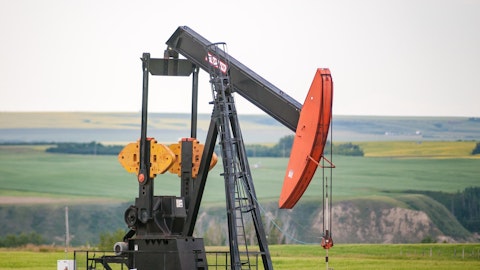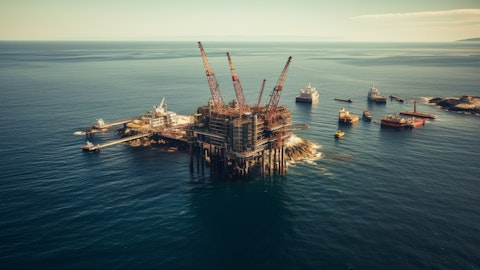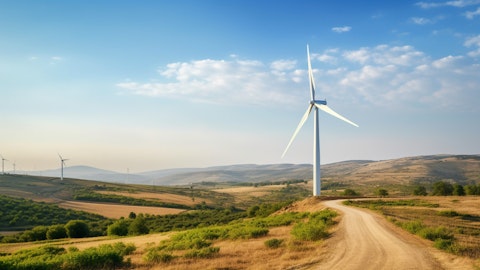Lane Riggs: And it’s January. So we still have the possibility of cold weather hitting the Gulf Coast.
Manav Gupta: Thanks, guys.
Operator: Thank you. The next question is coming from Sam Margolin of Wolf Research. Please go ahead.
Sam Margolin: Hi. Morning, everybody. Thanks for taking the question.
Gary Simmons: Good morning.
Sam Margolin: I had a question on the gasoline market. You know, I think capture rate in 4Q may have benefited from butane economics, and so correspondingly if there was a high incentive to blend as much winter grade as possible, there may have been a low incentive to make and store summer grade, and there’s just a lot of NGL supply that is kind of making its way into stockpiles across a number of categories. And so I want to know if it makes sense to think about, you know, as we enter into driving season, if total gasoline inventories are maybe overstated, just given the quantity of, you know, maybe butane in that number.
Gary Simmons: Yeah, certainly in our system when you look at the cost to produce of a summer grade of gasoline, there’s no economics at all to be making summer grade gasoline and putting it into storage. You know, I think the only people that could be storing barrels at all, it would be high octane components, and they’re really just, you know, speculating that octane is going to get stronger. But we certainly see it that way, that the barrels that are in storage today are largely winter grade.
Sam Margolin: Great. And thanks. My non-follow-up second question is about SAF. And, you know, I’m just wondering how that market is developing for you commercially, you know, as we get closer to the SAF unit coming on. I think there’s a view that, you know, the SAF market could take on some, you know, contracted, you know, longer term kind of cost plus characteristics because airlines have levers to pass it through that are sort of outside of the policy regime. But would love your thoughts on how commercially SAF is developing as you get closer to production.
Eric Fisher: Yeah, Sam, I think you’ve said it well. We continue to talk to all the airlines and cargo carriers. A lot of their models are going to be based on more of a voluntary approach in sort of a jet plus basis that goes into a pass through to customers that want to offset their carbon footprint through their travel, you know, through their travel budgets. And so we continue to have a lot of those conversations. I think we’re very close on having several contracts done with airlines going into our early production from our project. So that continues to be progressing very, very well. So we don’t see that we’re going to have a problem moving all of the volume out of this project.
Sam Margolin: Awesome. Thank you so much.
Operator: Thank you. The next question is coming from Paul Sansky of Sansky Research. Please go ahead.
Paul Sansky: Morning all. I was going to ask about international shipping, but you’ve dealt with the Red Sea. So could you just talk a bit about Russia? There was big headlines about a port explosion there. I was wondering how much distillate and other product you’re seeing coming out of Russia as we start the year. Secondly, I think you’ve benefited a lot from Venezuelan, incremental Venezuelan crude. What’s your outlook there? And then finally, what are you seeing from Mexico with the new big refinery starting and Nigeria maybe with the refinery starting? Thanks.
Gary Simmons: Okay. Yeah, I’ll start with Russia. I think, you know, the drone attack that occurred last night, you know, probably the biggest market impact we’re seeing so far is you’ve seen a reaction in the naphtha market. That refinery supplied a lot of naphtha to the Far East, and so there’s concern that that flow may be gone, and so the naphtha market’s tightened up. I think you do see distillates starting to fall, you know, and some of what we’re seeing is that, you know, as the refineries experience some issues, they’re having trouble getting support from the West that they typically would, even for things like, you know, spare parts and those types of things. So, you know, we do see that maybe distillate starts to trend off a little bit due to those issues. The middle part of the question was?
Paul Sansky: Venezuela. Venezuela.
Gary Simmons: Okay, yeah. So we continue to ramp up our volume of Venezuelan crude. I think, you know, the lifting of sanctions more than additional volume into our system probably had more of a price impact, you know, so we did see a little bit more value in the fourth quarter on the Venezuelan barrels that were running as a result of, you know, further reducing some of the sanctions that they have on Venezuela.
Paul Sansky: Mexico refineries, though.
Gary Simmons: Yeah, so we’re not seeing any impact as of yet from the Mexico refineries. You know, when we talk about crude supply, there’s always the discussion that, you know, we may see some fall off in our supply of Maya, but that really hasn’t impacted us yet. And we don’t see any delta on the product side of the business yet either.
Paul Sankey: And I guess that would then apply to Nigeria as well, right?
Gary Simmons: Yes, same thing. We think in our mind, it’s going to take a while for that refinery to ramp up. It’s just a big refinery that’s not going to be easy to bring online.
Paul Sankey: Great. And then just a follow-up second question here, Homer. Lane, you said that you don’t anticipate the asset base changing greatly with the change that we saw last year in CEO with you taking the leadership. Can you just update us, given the number of assets that are on the market? And perhaps if you want to add anything on California where results look weak for the quarter, and you’ve expressed dismay policies there? Thanks, I’ll leave it there. Thanks.
Lane Riggs: Yes. I mean Joe has been pretty consistent as a leadership team, we’ve been pretty consistent. We look at everything that comes on to the market. I think structurally, our view really is whether it’s policies in Europe and Canada and the United States in terms of the desire to try to move away from fossil fuels, the difficulty of — and the difficulty is to make investments, we sort of see transportation fuels being structurally short. So we do look through that lens when we look at assets that come on. We also start during the 2000s, we were the biggest consolidator in the industry. So we know what it takes to do this, and we’re very good at it. And so we — our eyes are wide open when we look at all these assets and they come on and we understand the full cost and we compare that with organic growth and we compare that to buying back shares.





